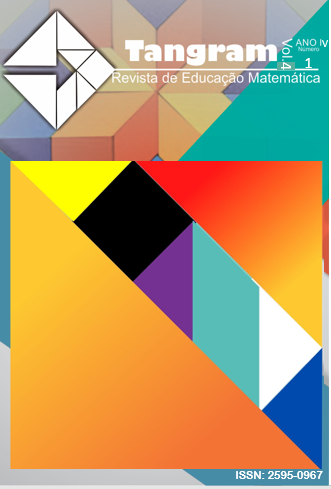Cenários animados no GeoGebra e o estudo de funções por alunos com altas habilidades/superdotação
DOI:
https://doi.org/10.30612/tangram.v4i1.12629Keywords:
Tecnologias digitas, Altas Habilidades/ Superdotação, Funções.Abstract
Um software que se destaca para o ensino da Matemática é o GeoGebra, por permitir reflexões e investigações sobre representações feitas. Os alunos com Altas Habilidades/Superdotação (AH/SD) necessitam de tarefas que explorem suas capacidades. Neste contexto, este trabalho teve como objetivo investigar as contribuições da construção de cenários animados no software GeoGebra para a o ensino e aprendizagem de funções de primeiro grau a alunos com AH/SD da Sala de Recursos Multifuncional (SRM). Para tanto a pesquisa assume como método o estudo de caso de cunho investigativo interpretativo, em que analisamos a partir de registros um episódio de aula referente a construção do cenário animado de um submarino submergindo e depois emergindo do fundo do mar. Verificamos apropriações dos alunos em relação a domínio e comportamento de funções do primeiro grau por meio das construções no software, suportados pelas mediações do professor para a significação dos conteúdos de matemática.Downloads
Downloads
Published
How to Cite
Issue
Section
License
Authors must accept the publication rules when submitting the journal, as well as agree to the following terms:
(a) The Editorial Board reserves the right to make changes to the Portuguese language in the originals to maintain the cultured standard of the language, while respecting the style of the authors.
(b) Authors retain the copyright and grant the journal the right to first publication, with the work simultaneously licensed under the Attribution-NonCommercial-ShareAlike 3.0 Brazil (CC BY-NC-SA 3.0 BR) that allows: Share - copy and redistribute the material in any medium or format and Adapt - remix, transform, and create from the material. CC BY-NC-SA 3.0 BR considers the following terms:
- Attribution - You must give the appropriate credit, provide a link to the license and indicate whether changes have been made. You must do so under any reasonable circumstances, but in no way that would suggest that the licensor supports you or your use.
- NonCommercial - You may not use the material for commercial purposes.
- Sharing - If you remix, transform, or create from material, you must distribute your contributions under the same license as the original.
- No additional restrictions - You may not apply legal terms or technological measures that legally restrict others from doing anything that the license permits.
(c) After publication, authors are allowed and encouraged to publish and distribute their work online - in institutional repositories, personal page, social network or other scientific dissemination sites, as long as the publication is not for commercial purposes.


